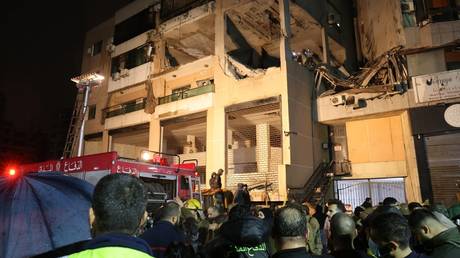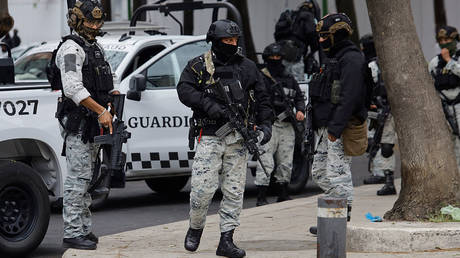
The Lebanese armed group has said it has “its finger on the trigger” in response to the killing of Hamas’ deputy leader
The Lebanese armed group Hezbollah has blamed Israel for the drone strike in Beirut that killed Hamas deputy leader Saleh al-Arouri, and promised that the crime won’t be left answered.
Al-Arouri was among seven people who died in the attack, which took place in the suburbs of the Lebanese capital on Tuesday.
Several hours after the incident, Hezbollah, which is an ally of Palestinian armed group Hamas, issued a statement, warning that “its finger [is]on the trigger.”
The group described the drone strike as a “serious assault on Lebanon,” insisting that “this crime will never pass without response and punishment.”
“The criminal enemy – which after ninety days of crime, killing and destruction was unable to subjugate Gaza – is resorting to a policy of assassination,” Hezbollah stated, referring to Israel.
Lebanese caretaker Prime Minister Najib Mikati said that he told the country’s foreign minister to submit an urgent complaint to the UN Security Council over the drone strike, which he described as a “flagrant attack on Lebanese sovereignty.”
In a separate statement, Mikati claimed that the killing of al-Arouri was an attempt to “drag Lebanon into a new phase of confrontation” and called on the international community to “put pressure” on Israel to stop its attacks on the country’s territory.
Following the warning by Hezbollah, IDF spokesman Rear Admiral Daniel Hagari said that Israel is at a “very high level of readiness — in all arenas, in defense and offense” and is prepared “for any scenario.”
Israel hasn’t claimed responsibility for the attack in Beirut, in line with the country’s policy of keeping silence on extraterritorial assassinations. However, one Israeli and two US officials told Axios, a news outlet, that Israel was behind the drone strike.
In November, Israeli Prime Minister Benjamin Netanyahu announced that he had instructed Israeli intelligence agents to “act against the heads of Hamas wherever they are.” Last month, the Wall Street Journal reported that Netanyahu had approved a plot to target Hamas officials in Lebanon, Türkiye and Qatar.
Hezbollah has been engaged in almost daily exchanges of fire with the IDF on the Israeli-Lebanese border since October 7, when Israel began its airstrikes on the Gaza Strip in response to the deadly Hamas attack.
READ MORE: Israel-Hamas war could spark global crisis – ex-Turkish PM
Despite describing itself as being “at war” with Israel, Hezbollah has so far been avoiding major escalations, saying that its actions in the border area are aimed at tying up the IDF’s forces to prevent their deployment to Gaza.




